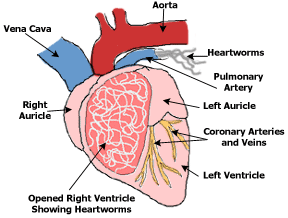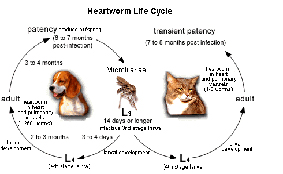As part of the series of pets medicine posts I am going to produce a 2 post guide to heartworms and Dogs. This first post will talk about what exactly heartworms are and the life-cycle of heartworms in Dogs. The second post will take a look at the different heartworm medicines available and compare them to each other as far as price and how effective they are. You can view the price comparison for heartworm medicines for Dogs here.
Pet meds are a series business and as we saw in the cheapest pet medicines post there are some crazy differences in the prices that we can pay. If we can prevent things such as heartworms without needing to buy pets medcines then all the better. I will look at natural prevention later on. First let’s take a look at exactly what the heartworm is.
The Heartworm And Dogs
 The heartworm goes through a fairly complicated life-cycle in order to be a threat to our Dogs, we shall look at that in a moment, but what is a heartworm? Basically it is a parasitic roundworm known as Dirofilaria immitis which is spread to Dogs via mosquitos.
The heartworm goes through a fairly complicated life-cycle in order to be a threat to our Dogs, we shall look at that in a moment, but what is a heartworm? Basically it is a parasitic roundworm known as Dirofilaria immitis which is spread to Dogs via mosquitos.
It is commonly called a heartworm because when it is an adult is is most often found in the right ventricle of the heart. The heartworm is a type of filaria which is a small thread like worm, but if you have seen any images of the adult worms they are anything but small. They grow to well over seven inches and can grow to as much as fourteeen inches inside the Dogs body. The heartworms life is tied to that of the mosquito which brings us to the next section of this post.
The Life-Cycle Of The Heartworm In Dogs
The only way that a Dog can get heartworms is if it has been bitten by a mosquito that carries the heartworm at its larval stage. No mosquitoes equals no heartworms. Unfortunately most of us now live in areas where there are at least certain times of the year when there are mosquitoes about. Living in Spain it is the one thing I dread about the summer. Not because of the Dogs (although that is a concern), but because I explode in giant red lumps whenever I get bitten. (excuse the moan). Back to the lifecycle of the heartworm.
This image explains it quite well.
Basically what we are looking at is a Dog that has adult heartworms. The female adults can produce literally thousand of tiny microscopic worms. These worms are simply the larvae of the adult. Now the mosquito comes in to play. If a mosquito sucks the blood of a Dog that has these larvae inside it it may draw up some as it sucks the blood. The tiny larvae are now in the mosquito. For them to survive in the mosquito they need a temperature of about 27 degrees. If the temp gets below 14 degrees celsius they will not live and the cycle is broken.
If the temperature is sufficient for them to survive then when the mosquito bites a Dog it passes the larvae on to the Dog. They will stay under the skin at the site of the bite for a week or two. They then begin to move to the chest and abdomen. All the while they are going through developmental stages and slowly growing towards adulthood.
After almost half a year after they are first introduced in to a Dog they finally reach the bloodstream and head for the heart. They then begin to grow towards adulthood which can take months longer. This is a very slow process and it can be years before any symptoms are noted in a Dog.
This process is very long and I am amazed how convoluted it is. At its most basic it is the mosquito that is our enemy. If we get warm weather then the risk is there that our Dogs may get heartworms.
Symptoms Of Heartworm Disease In Dogs
The symptoms of heartworm disease in Dogs are quite varied. In Dogs that lead fairly relaxed and sedate lives there may be no signs of them at all and they will do little damage. However in more active Dogs, and all our Dogs should be active, the first signs may be a cough or a lack of energy when out for exercise. Later signs may be coughing up blood, weight loss, fainting and if left untreated the final outcome may be heart failure.
Obviously if we see any of these symptoms we will be straight to the vets.
Treating Heartworm Disease
The good news is that the treatment of heartworms in Dogs has a very high success rate. The treatment is arsenic based although new treatments are beginning to be used. The treatment kills the heartworms. The risk comes because the dead worms are still inside the Dog.
This means that the Dog has to have little or no exercise for a few weeks after the treatment. This allows time for the body to safely absorb the dead worms. If the worms are dislodged while still large they may travel to the lungs and can cause death in the worst case scenario.
Preventing Heartworms In Dogs
The best way to prevent heartworms is with a monthly treatment. I will be looking at the different treatments available in the next post but basically there are a few products that can be given. These are brands like Heartgard (Monthly) or cheaper generic brands like Valuheart (Monthly). They all perform the same function which is to kill the larvae that would otherwise grow to adults in our Dogs. It may well be worth considering products that also prevent mosquitoes from biting your Dog. This is not as good as a product dedicated to killing the heartworm larvae but it will certainly help decrease the risk quite substantially. Whatever you decide, if you use heartworm medicines (normally heartworm pills) it is important that the Dogs are first tested to ensure they are healthy and free from adult worms. Giving a monthly treatment to a Dog with adult heartworms can be dangerous.
Natural Heartworm Prevention
You may remember a while ago I wrote about natural alternatives to frontline medicine and how they really did not perform anywhere near as well at preventing ticks and fleas. There are a few ways that we can naturally lessen the likelihood of mosquitos attacking our Dogs but they are by no means fool proof. And, as with preventing ticks and fleas the natural remedies simply are not as effective.
You can try a natural mosquito repellent which you may use yourself. You can put some on your Dogs fur to help prevent mosquitos but they never seem to work on me so I am not sure how effective they would be.
Apple cider vinegar added to the Dogs water bowl may mean your Dog is less tasty to mosquitos which will lower the risk of them getting heartworms.
What I think is the best natural way to guard against the heartworm carrying mosquito is to ensure the Dogs are inside at dawn and dusk. Keeping the animals away from the mosquitos is by far the best natural alternative. It is what we always try to do. Partly because I also seem to be a mosquito magnet and react so badly. I alwayscover up at mosquito time or more often than not I am inside with the Dogs. Keep the Dogs inside at the time you know mosquitos are present and you will greatly lower the risk of them being bitten.
You can also try getting some frogs! Anything that likes to eat mosquitos and their larvae will help to decrease the population and thereby lower the potential risk.
Look out for the next post where I will be finding out what the best heartworm medicine is. I will be looking at the top brands and the generic brands which are half the price. I will also be looking at whether we should be buying without a prescription. It will be interesting to see how each compares in price and how effective they are at preventing heartworms in Dogs.
May the Doggie Force be with you all.

Good information on meds and pricing. I appreciate your time and effort.
Good information on meds and pricing. I appreciate your time and effort.
BTW I love your blog!
Wow, a double Jan post. Hello to the first Jan and thank you. And hello to the new Jan, glad that you both found it useful.
I found out today my dog has heartworms. Though showing no signs I decided to get her tested as part of a routen exame. YOUR INFO WAS VERY HELPFUL thank you
Hi Melissa,
Sorry to hear that your Dog has heartworms. I am glad that you found the post useful though. I hope he/she recovers quickly which I am sure will be the case.
just found this site, very useful info. I’m always concerned about the topical products (frontline etc) on my large, thick coated lab. I never am sure if he is truly getting the medicine. I would like to try the Revolution to take care of 3 problems in one. thanks, christina.